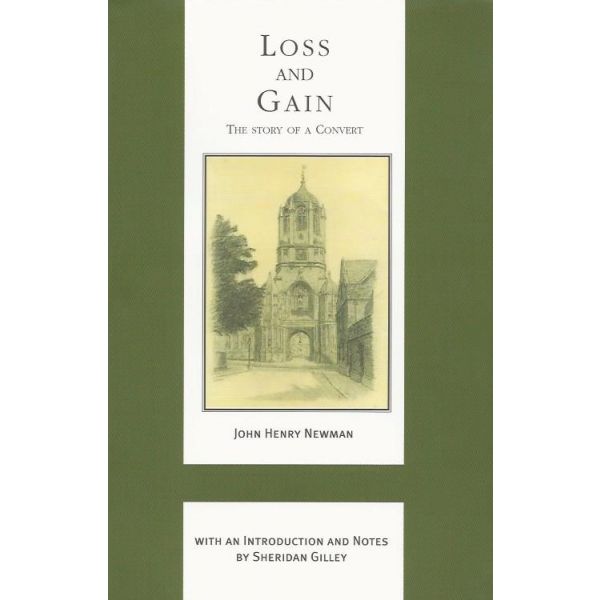Currency
Loss and Gain: The Story of a Convert
£25.00
t may seem surprising to discover that a Catholic Cardinal was a novelist, and Newman advanced this as an obstacle to his own canonization: ‘Saints are not literary men’, he wrote, `they do not love the classics, they do not write Tales’. He was only fit ‘to black the saints’ shoes – if St Philip uses blacking, in heaven.’
The background to Loss and Gain was a controversialist one. Newman wrote the book in part to provide a title for publication by James Burns, of the later celebrated firm of Burns and Oates, who had lost his stable of Anglican authors by converting in 1847 to Catholicism.
An understanding of the novel requires some knowledge of its Oxford background, of the university setting, which was compared in the fierceness of its loyalties by Newman’s friend Richard Church to a Renaissance Italian city, implying an assassin with a stiletto round every corner. In short, there is a sense in which in spite of its fictional character, Loss and Gain is a work of controversy, full of echoes of old battles, over whether the Thirty Nine Articles of Religion and the Book of Common Prayer should be interpreted in a ‘Catholic’ or a ‘Protestant’ sense. It is a response like Newman’s other works to a challenge, and so its hero, Charles Reding, as a student in Oxford, passes through the hands of the representatives of a number of Anglican parties and schools of theology before resolving his doubts in Rome.
Product Code
loss-and-gain-the-story-of-a-convert
It may seem surprising to discover that a Catholic Cardinal was a novelist, and Newman advanced this as an obstacle to his own canonization: ‘Saints are not literary men’, he wrote, `they do not love the classics, they do not write Tales’. He was only fit ‘to black the saints’ shoes – if St Philip uses blacking, in heaven.’
The background to Loss and Gain was a controversialist one. Newman wrote the book in part to provide a title for publication by James Burns, of the later celebrated firm of Burns and Oates, who had lost his stable of Anglican authors by converting in 1847 to Catholicism.
An understanding of the novel requires some knowledge of its Oxford background, of the university setting, which was compared in the fierceness of its loyalties by Newman’s friend Richard Church to a Renaissance Italian city, implying an assassin with a stiletto round every corner. In short, there is a sense in which in spite of its fictional character, Loss and Gain is a work of controversy, full of echoes of old battles, over whether the Thirty Nine Articles of Religion and the Book of Common Prayer should be interpreted in a ‘Catholic’ or a ‘Protestant’ sense. It is a response like Newman’s other works to a challenge, and so its hero, Charles Reding, as a student in Oxford, passes through the hands of the representatives of a number of Anglican parties and schools of theology before resolving his doubts in Rome.
| Isbn / Product Code | 9780852444108 |
|---|---|
| Dimensions | 229 x 152 x 14 |
| Printed Pages | 236 |
| Format | Paperback / softback |
| Year Of Publication | 25/6/2008 |
| Publisher | Gracewing |
| Author | Newman, Cardinal John Henry |




